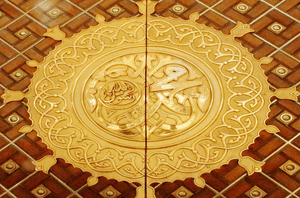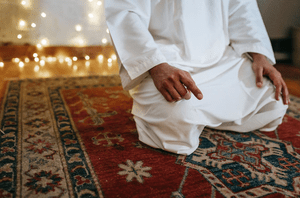Whenever you stand to pray, pray as though this ṣalāh is your final ṣalāh. The Messenger of Allah ﷺ said, “Remember death in your ṣalāh because when an individual remembers death in his ṣalāh, he is more likely to perfect his ṣalāh. And pray the ṣalāh of an individual who thinks he is not going to be able to perform another prayer” (Daylamī).
Whilst praying ṣalāh, imagine that you are standing before Allah (ʿazza wa jall) and your reckoning is about to take place. Imagine you are on the Ṣirāṭ (the bridge): try to visualise Paradise in front of you and the Hell-fire beneath you.
During congregational prayers, try to visualise yourself on the Day of Judgement when you are standing in front of Allah (ʿazza wa jall) as He says, “And they will be presented before your Lord in rows…” (18:48).
A predecessor (raḥimahullāh) said, “If only you had witnessed one of them when he stood up to pray; when he would stand in his place of prayer and commence with the words of his Master, it would cross his mind that he is now standing in the station where the people will stand in front of the Lord of the worlds. This would rip his heart open and make him forget everything else.”
Allah (ʿazza wa jall) says, “And seek help through patience and prayer, and indeed, it is difficult except for those who have khushūʿ; those who are certain that they will meet their Lord and that they will return to Him” (2:45-6).
This āyah states that in order to enjoy khushūʿ, you must firmly believe that you will meet Allah (ʿazza wa jall). To attain khushūʿ, strengthen your īmān in the hereafter and in meeting Him. Develop the yearning (shawq) and eagerness to meet Him and see Him in Jannah.
Death
Remembering death is vital to eliminate the love of this world from our hearts and getting closer to Allah. The Messenger of Allah ﷺ said, “Frequently remember the destroyer of pleasures” i.e. death (Tirmidhī).
An effective way to remember death is to visit graveyards. The Prophet ﷺ said, “I used to forbid you from visiting graves, but now go and visit them; for this softens the heart, makes the eyes weep and reminds one of the Hereafter” (Ḥākim).
Whilst visiting the graveyard, Imām al-Qurṭubī (raḥimahullāh) advises one to ponder and think about the lives and deaths of those who have gone. Reflect on how they achieved their worldly ambitions and gathered wealth, but were then cut off from it all. It is no longer of any use. Consider how the earth has wiped away the beauty of their faces; how they have disintegrated in their graves; and how their wives have become widows and their children orphans. Reflect on the folly of being deceived by material means, relying on good health and youth, and attaching oneself to entertainment and leisure. Reflect on the inevitability of ending up where they have ended up. Ponder on the state of the deceased: his legs are destroyed, his eyes have liquified, the worms have eaten his tongue, and the earth has consumed his teeth (adapted from al-Tadhkirah).
Saʿīd b. ʿAbd al-ʿAzīz (raḥimahullāh) used to weep when he would pray and tears would drip onto the mat. **When praying on the mat, the person beside him would hear his weeping**. He was asked, “What is this crying that you do during your ṣalāh?” He said, “Son, why are you asking me this?” The questioner replied, “I am hoping that Allah will benefit me through it.” Saʿīd said, “I have never stood up to pray except that Hell-fire appears in front of me.”
It was as though he could see Hell-fire burning and raging in front of him, whilst its inhabitants cry out, “‘Lord, let us out, and we will do righteous deeds, not what we did before!’ – ‘Did We not give you lives long enough so that whoever wanted to be mindful could have done so? The warner came to you, now taste the punishment.’ The evildoers will have nobody to help them” (35:37).






